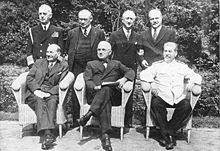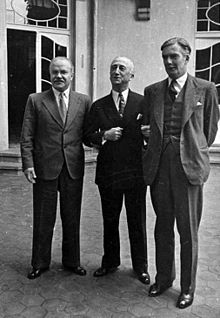James F. Byrnes
A member of the Democratic Party, he served in the U.S. Congress and on the U.S. Supreme Court, as well as in the executive branch, most prominently as the 49th U.S. Secretary of State under President Harry S. Truman.
Born and raised in Charleston, South Carolina, Byrnes pursued a legal career with the help of his cousin, Governor Miles Benjamin McSweeney.
Historian George E. Mowry called Byrnes "the most influential Southern member of Congress between John Calhoun and Lyndon Johnson".
Roosevelt appointed Byrnes to the Supreme Court in 1941 but asked him to join the executive branch after America's entry into World War II.
He was a candidate to replace Henry A. Wallace as Roosevelt's running mate in the 1944 election, but instead Harry S. Truman was nominated by the 1944 Democratic National Convention.
As governor, he opposed the Supreme Court decision in Brown v. Board of Education and sought to establish "separate but equal" as a realistic alternative to the desegregation of schools.
[12] Byrnes proved a brilliant legislator, working behind the scenes to form coalitions, and avoiding the high-profile oratory that characterized much of Southern politics.
He became a close ally of US President Woodrow Wilson, who often entrusted important political tasks to the capable young Representative, rather than to more experienced lawmakers.
Between his law practice and investment advice from friends such as Bernard Baruch, Byrnes became a wealthy man, but he never excluded himself from a return to politics.
[17] He won an easy re-election in 1936, promising: I admit I am a New Dealer, and if [the New Deal] takes money from the few who have controlled the country and gives it back to the average man, I am going to Washington to help the President work for the people of South Carolina and the country.Byrnes also criticized those who spoke out against the interventionist policies of the Roosevelt Administration by making references to Thomas Jefferson and states’ rights, arguing that Jefferson was a progressive and liberal as well a “champion of the masses.” Adding to his point, Byrnes asserted that “if the sage of Monticello were alive today, he would frown upon any effort to use his views of states’ rights to block social and economic reforms so badly needed to improve conditions for those who labor in the factories and toil in the fields.”[18] Since the colonial era, South Carolina's politicians had dreamed of an inland waterway system that would not only aid commerce but also control flooding.
By the 1930s, Byrnes took up the cause for a massive dam-building project, Santee Cooper, that would not only accomplish those tasks but also electrify the entire state with hydroelectric power.
With South Carolina financially strapped by the Great Depression, Byrnes managed to get the federal government to authorize a loan for the entire project, which was completed and put into operation in February 1942.
In 1937, Byrnes supported Roosevelt on the highly-controversial court packing plan, but he voted against the 1938 Fair Labor Standards Act, as a minimum wage would potentially make the textile mills in his state uncompetitive.
On foreign policy, Byrnes was a champion of Roosevelt's positions of helping the United Kingdom against Nazi Germany in 1939 to 1941 and of maintaining a hard diplomatic line against Japan.
[27] Byrnes left the Supreme Court to head Roosevelt's Office of Economic Stabilization, which dealt with the vitally-important issues of prices and taxes.
[28] Under the leadership of Byrnes, the program managed newly constructed factories across the country that used raw materials, civilian and military production, and transportation for United States Armed Forces personnel and was credited with providing the employment that was needed to bring an official end to the Great Depression.
[29][30][31] Thanks to his political experience, his probing intellect, his close friendship with Roosevelt, and in no small part his own personal charm, Byrnes was soon exerting influence over many facets of the war effort that were not technically under his departmental jurisdiction.
Byrnes was regarded as too conservative for organized labor; some big city bosses opposed him as an ex-Catholic who would offend Catholics; and blacks were wary of his opposition to racial integration.
As head of the wartime Office of War Mobilization, Byrnes provided oversight, material and financial resources for the high priority Manhattan Project.
Additional feedback was provided by the Committee on the Social and Political Implications of the Atomic Bomb, formed by Metallurgical Laboratory of the University of Chicago, chaired by James Franck with Leo Szilard and Glenn T.
[40] Despite personally objecting to any guarantees of retaining Hirohito, Byrnes remained ambiguous on that point in a draft reply to Japan's offer of surrender of August 10.
[46] Personal relations between the two men grew strained, particularly when Truman felt that Byrnes was attempting to set foreign policy by himself and to inform the President only afterward.
Truman considered the "successes" of the conference to be "unreal" and was highly critical of Byrnes's failure to protect Iran, which was not mentioned in the final communiqué.
[47] In a subsequent letter to Byrnes, Truman took a harder line in reference to Iran: "Without these supplies furnished by the United States, Russia would have been ignominiously defeated.
[48] That led to the Iran crisis of 1946 in which Byrnes took an increasingly hardline position in opposition to Stalin, culminating in a speech in Germany on September 6, 1946.
To that end, he sought to fulfill at last the "separate but equal" policy that the South had put forward in Supreme Court civil rights cases, particularly in regard to public education.
Byrnes poured state money into improving black schools, buying new textbooks and new buses, and hiring additional teachers.
That gave the NAACP's lawyer, Thurgood Marshall, the idea to shift the suit from South Carolina over to Kansas, which led directly to Brown v. Board of Education, a decision that Byrnes vigorously criticized.
In 1965, Byrnes spoke out against the "punishment" and the "humiliation" of South Carolina US Representative Albert Watson, who had been stripped of his congressional seniority by the House Democratic Caucus after endorsing Goldwater for president.
Byrnes openly endorsed Watson's retention in Congress as a Republican in a special election held in 1965 against Democrat Preston Callison.





